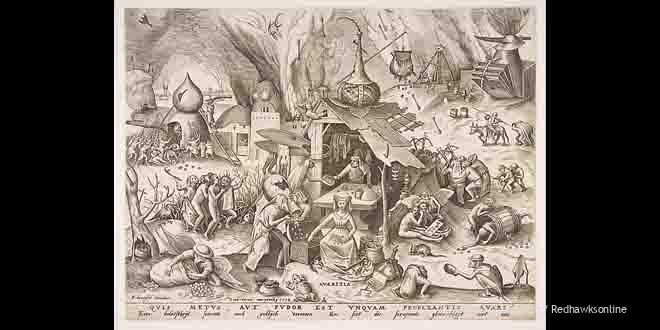The vice of greed is more than wanting more presents, even budging the lunch line is greed
Every year you read the story. That one about the true meaning of Christmas, and how it’s not about getting, it’s about giving. This year, The Talon will give you a break from the same tired lessons and attempt to shed new light on the sin of greed.
When we look at greed in our society, we often point out “America’s obsession with consumerism” as the 1st culprit. When we do this, we fail to notice more insidious outcroppings of greed that occur in our hearts and minds on a daily basis. In taking a closer look, we can see that our sense of entitlement for certain privileges represents another form of greed, one which is far less examined in our lives.
Greed, or avarice, is the excessive desire for material goods at the expense of other contemplation. We often allow our desires for things to preclude the pursuit of more honorable goals, like relationships with our friends and with God. However, material goods are not the only things we covet that have an overall negative effect on our relationships with others. Ideas of personal status and hierarchy are ones toward which we showcase excessive greed.
Just look at the lunch line. Recently, Jason Wenschlag, Upper School principal, made a request during chapel that the high school students (mostly seniors) refrain from budging in line. The responses to his request fell into two camps: some seniors declared that they have never budged and harbor no intentions of starting, while others defensively proclaimed their right as upperclassmen to cut in line. The tension inherent in the mixed responses springs from the fact that when the current seniors were freshmen, they had been budged by the seniors. Now that they are in a position of similar power, they feel that the right to budge is owed to them by the rest of the school.
There are a few problems with this way of thinking. For one thing, the greed is self-perpetuating. Every year, the newest set of seniors come to lunch fully prepared to finally obtain their “right to budge”. Their behavior would not have an impact in and of itself if the budging did not have its own adverse effects. Inter-grade camaraderie, which is so high between upperclassmen and underclassmen during sports seasons and club meetings, becomes strained when seniors go back to asserting their dominance within the school hierarchy by feeling excessive greed or entitlement.
Psychologist PJ Henry found in his research on social status that individuals who were more recently reminded of their self-worth and value are far less likely to have violent or belligerent mentalities. Thus, those with the power to stop the cycle of budging really hold sway over the attitude of the student body. By reminding underclassmen that they are a valued part of the Minnehaha community instead of unthinkingly following our greed for entitlement, we can curb the negative attitudes that will lead to later inter-grade tension.
The act of creating in-groups and out-groups has attained negative connotations in society today, but we must remember that it is a distinctively human trait that can also have positive outcomes. In-groups create a sense of community that can help individuals through some of the roughest times in their lives by giving them a sense of belonging. Problems only occur when certain in-groups feel greed for advancement or gain of which they feel other groups are undeserving.
I would argue that when Jesus says in Luke 12:33, “Sell your possessions and give to charity; make yourselves money belts which do not wear out, an unfailing treasure in heaven, where no thief comes near nor moth destroys,” he is not simply speaking of material possessions. Rather, Jesus warns that all earthly concerns-concerns like class rank, or fastest race time, or position in the lunch line-are all ultimately meaningless when we are faced with the prospect of eternal life.
So the next time you feel like waiting in line just isn’t worth your time, remember that the people in front of you are just that: people. Greed is one of the 7 deadly sins for a reason. It devalues our relationships by placing a high premium on personal status. The way we value each other ultimately matters more than our greed for earthly advancement.

